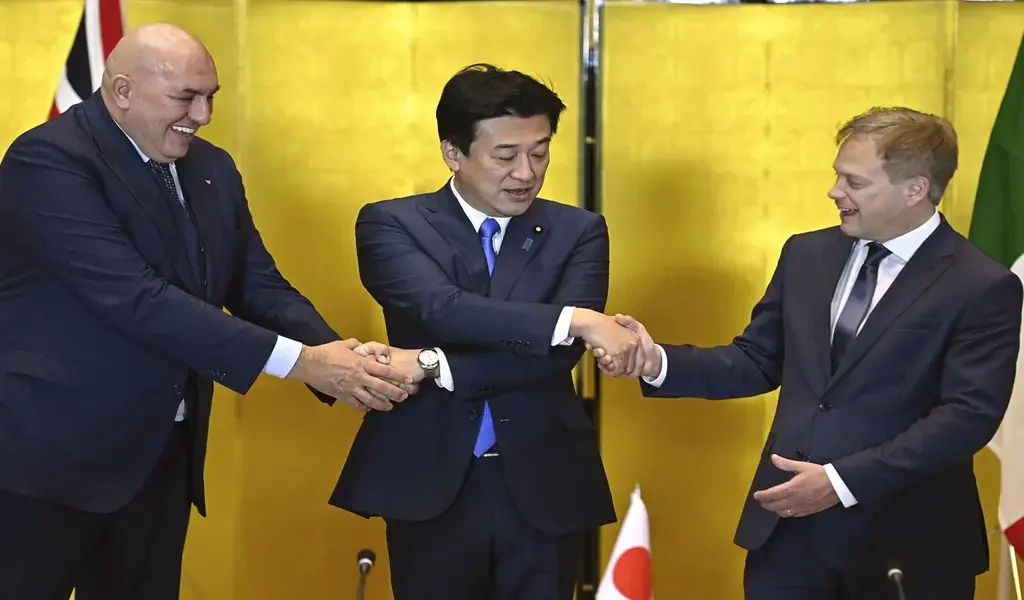(CTN News) – Japan’s Cabinet agreed on Tuesday to sell prospective next-generation fighter jets developed with Britain and Italy to other countries, marking the latest departure from the country’s postwar pacifist values.
The contentious decision to authorize international arms sales is likely to help ensure Japan’s role in the joint fighter jet project, as part of a strategy to strengthen the Japanese arms industry and its role in world security.
The Cabinet also approved a change to Japan’s arms equipment and technology transfer standards that would allow coproduced lethal weapons to be sold to nations other than its partners.
Japan has historically limited arms exports under its pacifist constitution but has recently taken moves to de-regulate amid rising regional and global tensions, particularly from neighboring China.
The decision on planes will allow Japan to export lethal weapons coproduced with foreign countries for the first time.
Japan is collaborating with Italy and the United Kingdom to create a modern fighter jet to replace its old fleet of American-designed F-2 fighters and the Eurofighter Typhoons used by the British and Italian forces.
Japan, which had previously worked on an indigenous design known as the F-X, agreed in December 2022 to combine its efforts with a British-Italian program known as the Tempest, with deployment scheduled for 2035. The Global Combat Air Program (GCAP) is a cooperative effort in the United Kingdom.
Japan expects the new jet to provide the advanced capabilities it requires as regional tensions rise, giving it a technological advantage over regional competitors like China and Russia.
Because of its history as an aggressor and the damage that resulted from its defeat in World War II, Japan adopted a constitution that restricts its military to self-defense. The country has traditionally had a strong policy of limiting transfers of military equipment and technology and prohibiting any exports of lethal weapons.
Opponents have criticized Prime Minister Fumio Kishida’s government for committing to the fighter jet project without informing the people or gaining agreement for the significant policy shift.
To address these concerns, the government is temporarily banning exports of codeveloped lethal armaments to the jet and has vowed that no sales will be made for use in active hostilities.
The administration also stated that for the time being, the updated policy only applies to the plane and would require Cabinet approval. Potential purchasers will also be limited to the 15 countries with which Japan has inked defense partnership and equipment transfer agreements.
Recent polls indicate that public opinion is mixed on the plan.
Japan began exporting nonlethal military goods in 2014, and last December, accepted a revision to allow sales of 80 lethal weapons and components manufactured under license from other countries back to the licensors.
The amendment allowed Japan to sell US-designed Patriot missiles to the US, which will help replace bombs that Washington is supplying to Ukraine.
In its decision, the Cabinet stated that the arms export prohibition on finished items would hamper attempts to create the new jet and limit Japan’s role in the project. Italy and the United Kingdom are eager to sell the plane to help cover development and manufacturing costs.
Kishida requested Cabinet permission before signing the GCAP pact in February, but it was delayed due to opposition from his junior coalition partner, the Buddhist-backed Komeito Party.
The adjustment comes as Kishida prepares for an April state visit to Washington, where he is expected to emphasize Japan’s willingness to play a larger role in military and defense sector cooperation.
Exports would also benefit Japan’s defense sector, which has traditionally served mainly the country’s Self-Defense Force, as Kishida pushes to strengthen the military. Despite its efforts over the last decade, the industry has struggled to attract clients.








